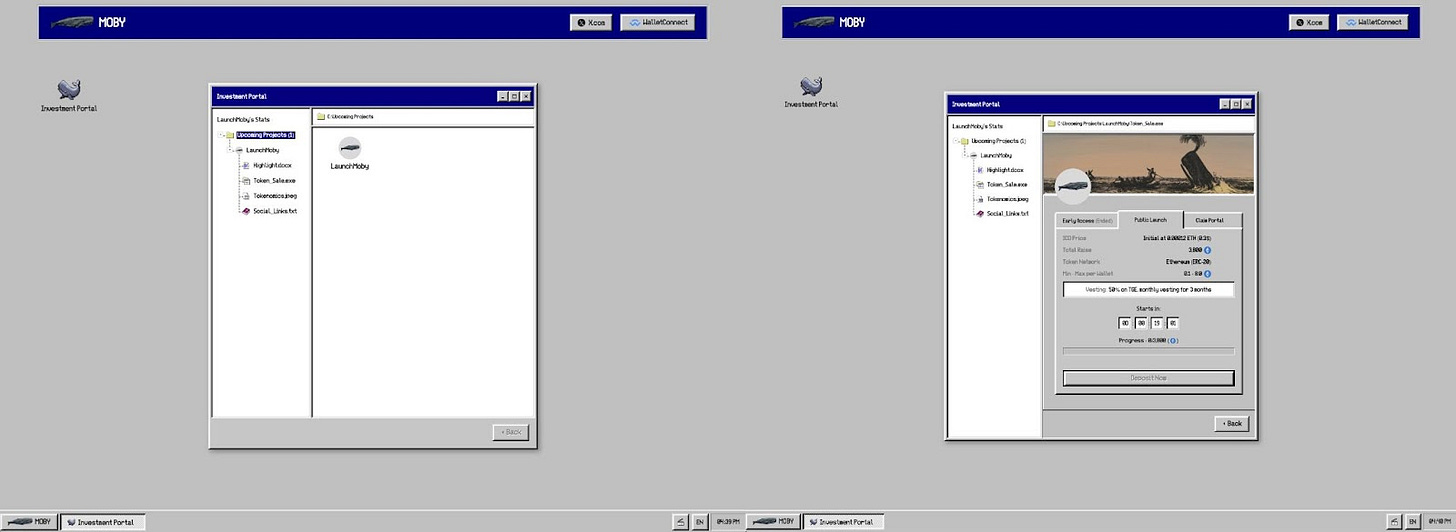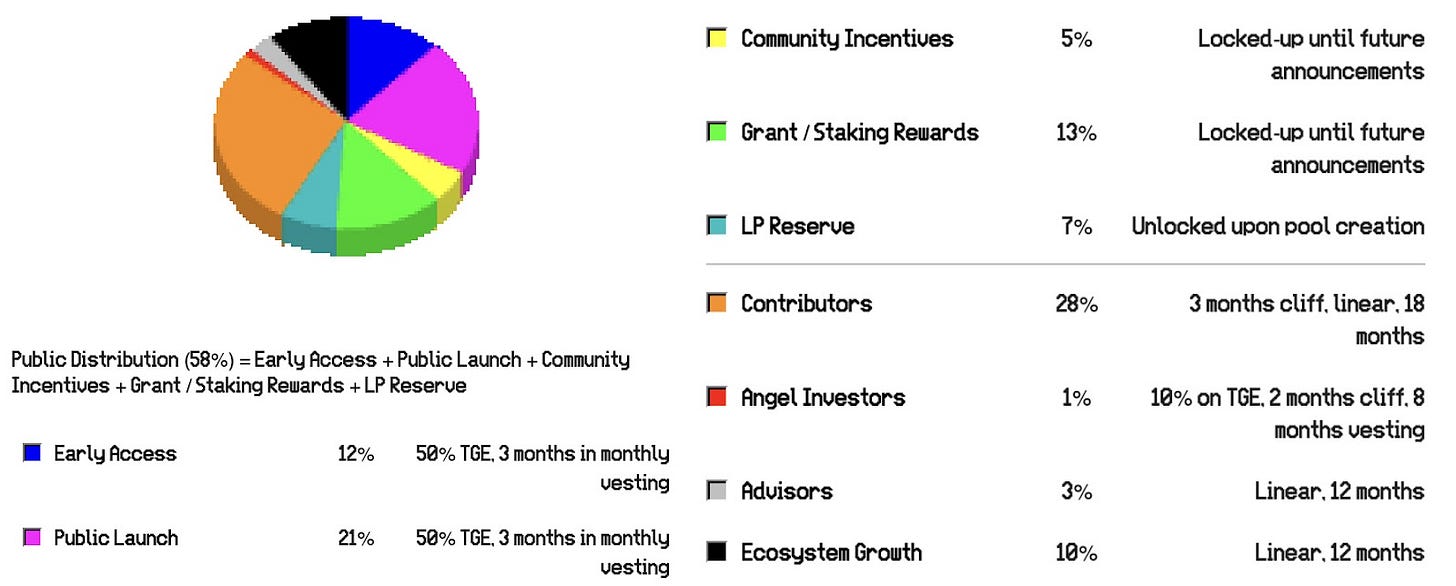Moby Explained: Return of the ICO Classics or Make ICOs Great Again
Community-driven ICO platform with BRC20 support
Disclaimer: The content presented in this article, along with others, is based on opinions developed by the analysts at Dewhales and does not constitute sponsored content. At Dewhales, we firmly adhere to a transparency-first philosophy, making our wallets openly available to the public through our website or DeBank, and our articles serve as vehicles for self-expression, education, and contribution to the ecosystem.
Dewhales Capital does not provide investment advisory services to the public. Any information should not be taken as investment, accounting, tax or legal advice or as a recommendation to purchase, sell or hold or to pursue any investment style or strategy. The accuracy and appropriateness of the information is not guaranteed by Dewhales Capital.
Introduction
1. Moby Vision
2. Moby Platform Overview
3. Tokenomics
4. Moby backers
Conclusion
Introduction
By the standards of the fast-growing crypto industry, ICOs have already been fairly replaced by sales on launchpads and into other formats like IEO, STO, IDO, where launchpad is replaced by another platform, but the general point remains similar.. Typically, in such cases, institutional players hold a controlling stake, with projects paying sales platforms significant commissions ranging from 10 to 20% of the proceeds. Also, most launchpads offer a single fundraising model for all projects, leaving little room for innovation and flexibility. Another problem is that due to a number of limitations, including those described above, the quality and quantity of projects on launchpads drops, leading to a stagnant community that is generally unable to influence any processes. Also, most launchpads do a poor job of filtering projects and decisions are made in a centralised manner.
What if we take what has been done before and make it fully transparent and community driven, and a network with no competitors? Let's open Moby and explore what makes it different from the usual launchpads.
1. Moby Vision
The cornerstone of Moby is its community-centric focus in all aspects of launching an ICO. Specifically, Moby provides a platform for Initial Coin Offerings (ICOs) for true community-driven projects where the community owns the majority of token holdings. This is backed by rigorous vetting and due diligence processes through a committee. Unlike most launchpads, Moby is inextricably integrated into the blockchain component and offers a platform that records all activity on the Ethereum blockchain and can provide full transparency and accountability.
The platform offers a unique ecosystem that includes an ICO investment portal for retail investors, a tokenisation portal to incentivise investors and a fundraising portal to launch projects. The platform differentiates itself by ensuring public ownership of at least 50% of its fees. In addition, the public ownership portal ensures equal decision-making power between the due diligence committee and token stakers, which ensures that project evaluation is democratic and transparent. That is, community-selected analysts from different areas of the crypto industry are responsible for selecting projects on the platform. This approach is aimed at restoring the integrity and trust of the community in ICOs.
Also, it is stated that Moby will prioritise the sale of projects in which the public owns the majority of the tokens. Thus, Moby is implementing a two-tiered decision-making process in the project selection process:
- First, a committee of 10 trusted participants selected by the community makes an initial selection of projects and pitches them to the community
- Next, platform members and MOBY token holders vote on which projects will be admitted directly to the ICO.
Moby, through its support of BRC20, aims to integrate itself into the Bitcoin ecosystem and its audience, which has recently shown rapid development on the back of the growing popularity of BRC20, BTC L2, Ordinals and so on. This aspect could breathe a new wave into both the Bitcoin ecosystem and the idea of launchpads, as the BTC ecosystem is now a field for a wide variety of experiments.
2. Moby Platform Overview
The Moby platform is deployed on Ethereum, using smart contracts on the blockchain and is optimised for the BRC environment. In addition, the platform includes strategies to optimise gas consumption so as not to increase the transaction load for users. The platform's old-school design also looks interesting, making references to Crypto OG:
Another important aspect that sets Moby apart from most similar solutions in the form of launchpads is its support for the BRC20 standard. This is a tokenisation standard launched in 2023, where tokens are embedded directly into Bitcoin satoshis using JSON code. In addition to BRC20, there is also support for the traditional ERC20. This is possible due to the fact that the $MOBY token is universal and available in both standards. This innovative approach is strategically designed to combine the security and stability inherent in the Bitcoin blockchain via the BRC-20 standard, while opening the gateway to the dynamic DeFi ecosystem and extending DApp functionality on Ethereum via the ERC-20 standard. Also inherent in Moby is the possibility of future scaling to L2 solutions.
The platform consists of several components:
ICO investment portal for retail investors: This portal streamlines the investment process by making ICOs more accessible to retail investors.
Token Staking Portal: This feature offers unique incentives such as whitelist access and revenue share. By staking tokens, investors not only support projects, but also receive potential financial benefits, fostering a more engaged and invested community.
Project Fundraising Portal: It provides projects with different fundraising models for their startup, catering to different needs and strategies. This flexibility allows projects to choose the fundraising method that best suits their goals and target audience.
Governance Portal: Balancing due diligence and tokenisation, this portal facilitates transparent and fair project evaluation. This ensures that project vetting is not only thorough but also democratic, involving the community in key decisions.
There are 4 options for users and projects to invest or fundraising mechanisms at once:
LBP Initial liquidity loading pool) via Moby's intuitive and easy-to-use website
Limited Market Capitalisation Launch - used if the project sets a Hard Cap and only a small number of participants can participate, which helps to control inflation, create scarcity and maintain token stability
Unlimited Market Capitalisation Launch - unlimited fundraising, which can be useful for some projects
Customisable Launch - Moby gives builders the flexibility to tailor their fundraising approach. Whether it's combining elements from different models or creating an entirely new strategy, this model ensures that projects have the tools they need to achieve specific goals.
Moby also states that Moby has 11 projects in the pipeline already, projects backed by the most reputable, recognisable, and credible investors in crypto, soon to be revealed.
3. Tokenomics
The first ICO on the platform was the Moby ICO on 7 February 2023, during which participants contributed 3,800 ETH in 36 minutes. The ICO started at $30M FDV and ended at max $60M FDV. Prior to that, on 1 February, there was an Early Access sale with an FDV of $25m, during which participants contributed 1,200 ETH (>$2.7mm) in 18 minutes.
The $MOBY token is used for:
- Staking, which gives automatic eligibility to participate in the ICO, in addition to potentially allowing its holders to receive Airdrops from projects on the platform.
- Platform governance
Unlike most launchpads, Moby takes a relatively small portion of the commissions, around 5%, of which 50% will be distributed amongst $MOBY stakers, thus creating additional incentives for stakers.
Moby's governance system has six tiers: Mobie, Citizen, Mayor, Senator, Governor, and President. These tiers differ in the amount of funds staked (from 1 to 30 ETH in MOBY tokens with $25m valuation), the degree of influence on decisions made, and the amount of revenue generated by Moby's commissions.
Token allocations
4. Moby backers
Moby has backers such as: Dewhales, Cryptomind, GuildFi, Modular Labs, Seungyoon Lee , Joseph Young, Cole0x, Jarindr Thitadilaka, Ivan Moralis, Michael Paik, Ran Neuner, TCVN, Ben Wee, and KOLs such as: KOOB, Sisyphus, Crypto Banter, 0xLeo, Kelvin Chua, 0xsal, Ed_x0101, Auri, Pan Paragraph, Jun Park, Kirbyong and others.
Moby DD committee currently includes members such as:
- Joseph Young (ex-HASHED, DGV founder)
- SY Lee (Story Protocol founder)
- Ben Wee (ex-VP at Crypto.com)
- 0xSal (Isdao founders)
- Ryan Kim (HASHED founder)
- Tommy (Spartan senior investor)
- Cole0x (Elixir co-founder)
- Mut.eth (DeWhales founder)
- Pool2Paulie (Angel investor, whale)
- Hatu (Ape Terminal founder)
- Jarindr (GuildFi founder and CEO)
- Frank (Co-founder, Apeiron)
- Garri (Founder, Moni)
Among the partnerships so far, Moby is connected to the L2 OKX test network and has a partnership with Holdstation, a futures trading platform.
Conclusion
Moby is quite an interesting platform despite the apparent simplicity of the idea, which has been implemented by a huge number of launchpads before. But the question is what was the approach before and how Moby implements it. Firstly, typically projects on launchpads were more often than not selected directly by the teams of the platforms, and communities, while tokenomics may have governance features, more often than not don't have any real weight in decision making. Secondly, due to the quality of the projects involved, the choice of chains and the lack of flexibility in ICO formats, interest in such formats started to cool down quite a long time ago.
And then Moby comes on the scene, offering BRC20 support in addition to Ethereum and L2, supporting new players and liquidity, but also offering a really clear and transparent community-driven platform model. As they say, the devil lies in the little things, and it's the little bricks that make it possible to make a really unique product, which at first glance seems similar to other projects, but actually contains small but very important fundamental things. And all the more this philosophy is close to Dewhales, which is a decentralised community that is created by and part of web3. After all, one of the main ideas of crypto and web3 is not only decentralisation of computing power, but also decentralisation and democratisation of governance.
Moby links:
Website | Twitter | Discord | Documentation






